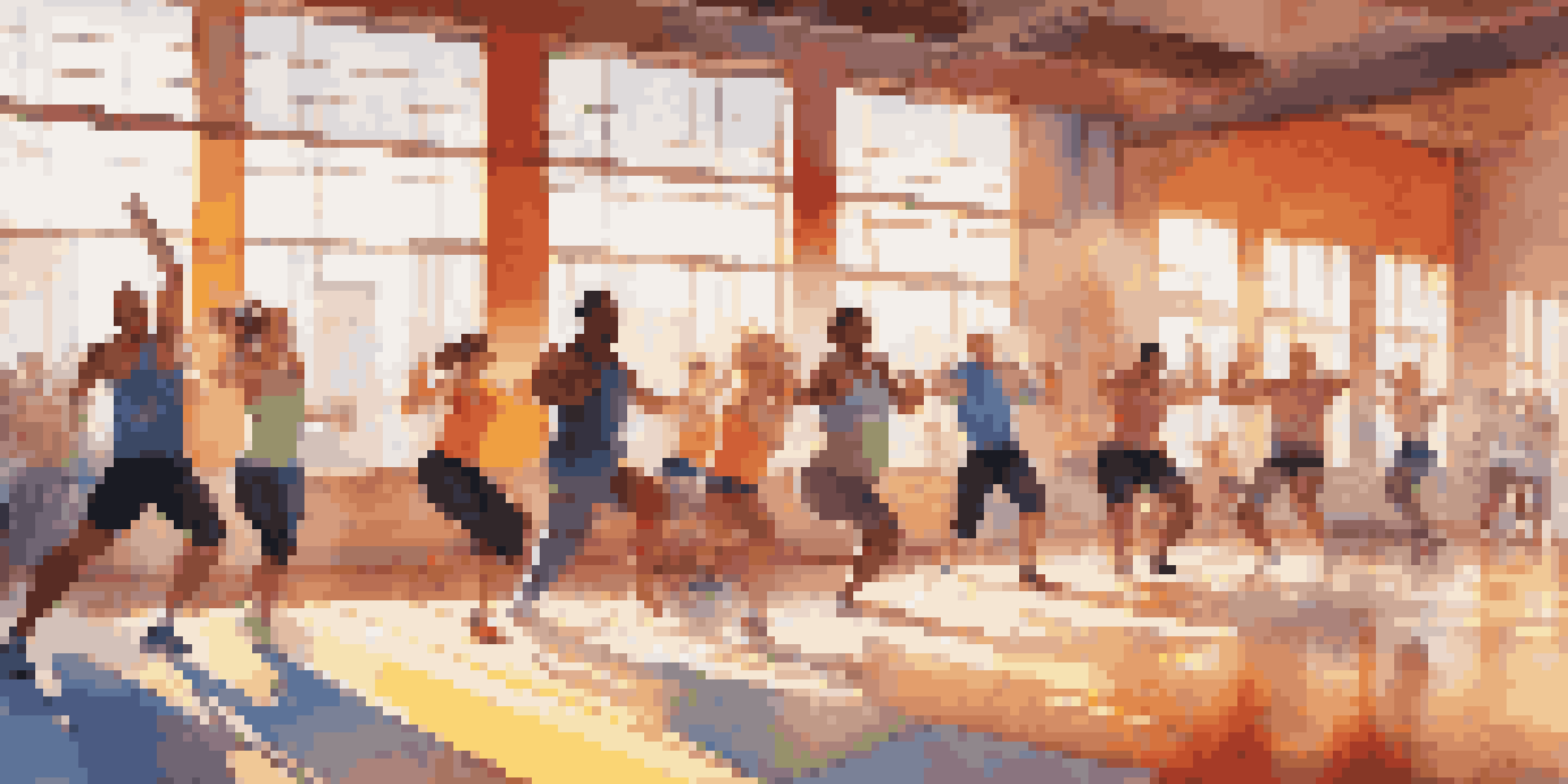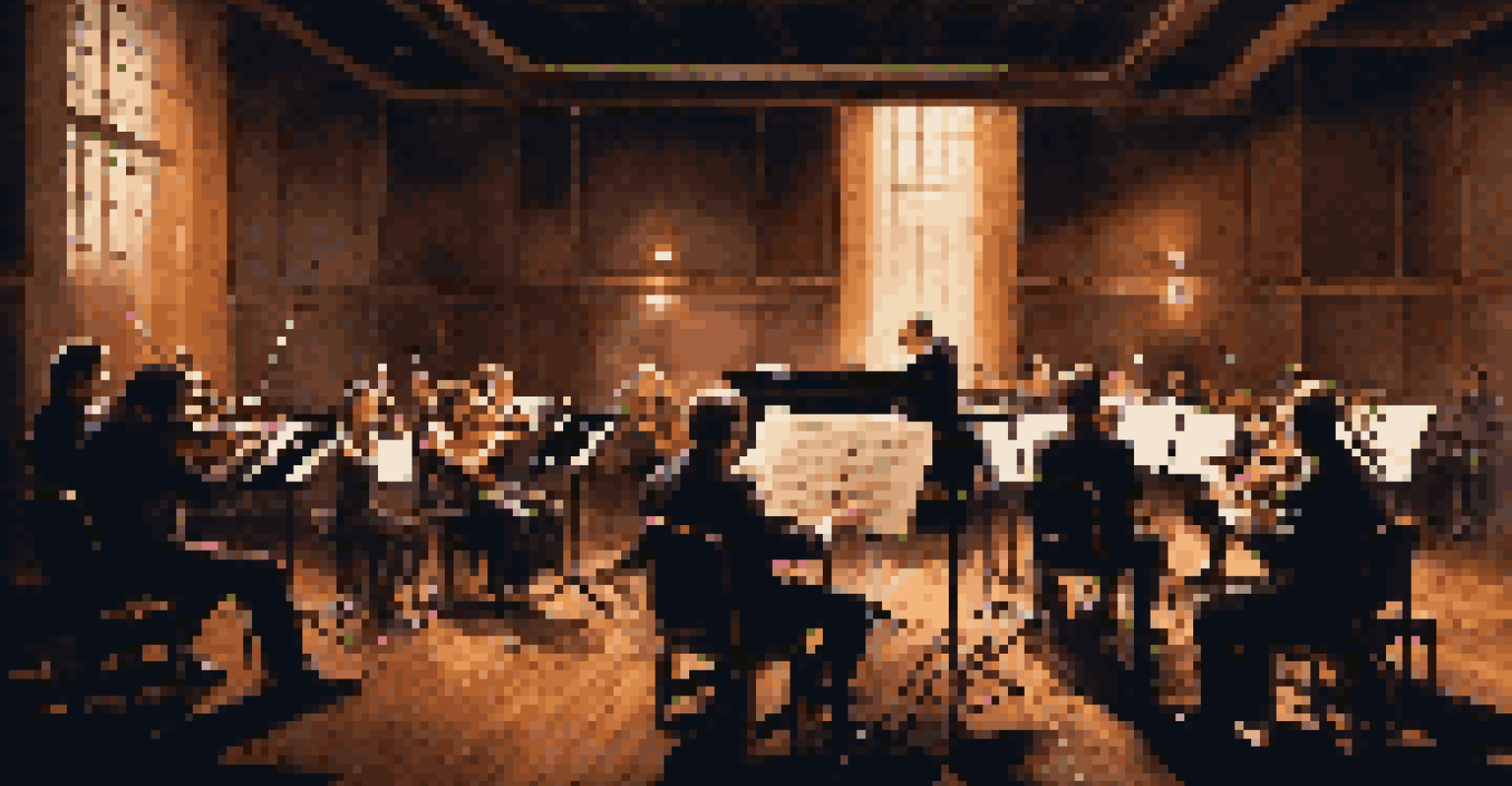Music's Role in Creating a Sense of Urgency Over Time

Understanding the Psychology of Music and Urgency
Music has a profound effect on our emotions, and its tempo can create a sense of urgency. Fast-paced rhythms can trigger our fight-or-flight response, making us feel more alert and energized. This psychological connection is why music is often used in advertising and film to heighten tension and anticipation.
Music can change the world because it can change people.
For example, think of the dramatic music that underscores a chase scene in a movie. The quick beats and escalating dynamics push us to feel the urgency of the moment. Similarly, when we hear an upbeat song in a store, we're often encouraged to make quicker purchase decisions.
Ultimately, understanding how music influences our emotions helps us recognize its power in shaping our experiences. This awareness can be leveraged in various situations, from marketing strategies to personal playlists that motivate us.
Historical Context: Music's Role in Urgent Situations
Throughout history, music has played a crucial role in urgent situations, from military marches to rallying cries. For instance, marching bands use powerful rhythms to instill a sense of urgency and unity among troops. This use of music fosters a collective spirit, pushing individuals to act quickly in high-pressure scenarios.

Consider the use of music during protests or social movements; songs that convey urgency often become anthems, uniting people in their cause. The emotional weight of these songs can galvanize action, demonstrating how music can shape societal responses to urgent matters.
Music Triggers Emotional Urgency
The tempo of music can evoke emotional responses, creating a sense of urgency that influences our actions and decisions.
By examining these historical contexts, we see that music has always been intertwined with human emotion and action. This connection illustrates its importance not just for entertainment but as a catalyst for urgency and change.
The Influence of Tempo on Our Sense of Urgency
Tempo, or the speed of the music, is a critical factor in creating a sense of urgency. Faster tempos can increase heart rates and stimulate a sense of excitement, compelling listeners to act. This is why workout playlists often feature high-BPM (beats per minute) tracks to keep energy levels up and encourage motivation.
Without music, life would be a mistake.
For example, if you’ve ever been at a party where the DJ transitions to a faster song, you might have felt an immediate urge to dance. The music elevates the mood and encourages movement, showcasing how tempo can manipulate our actions.
Thus, understanding tempo's role helps us curate experiences—whether in fitness, events, or even work environments—where urgency and high energy are desirable.
Soundtracks in Film: Creating Urgency Through Music
Film soundtracks are expertly crafted to evoke emotions, and urgency is often a key theme. Composers use music to heighten tension, signaling to audiences when to feel anxious or excited. This technique keeps viewers engaged and on the edge of their seats, effectively drawing them into the narrative.
Take the iconic score of 'Jaws,' where the gradual build-up of the music creates a palpable sense of dread. As the tempo accelerates, viewers instinctively prepare for the impending action. This demonstrates how soundtracks can dictate pacing, amplifying the urgency of a scene.
Historical Use of Music in Crises
Throughout history, music has been integral in urgent situations, uniting people and galvanizing action in times of need.
By analyzing these soundtracks, we can appreciate how music serves not just as background noise, but as a dynamic force that shapes our emotional responses to storytelling.
The Role of Music in Advertising and Marketing
In the world of advertising, music is a powerful tool for creating urgency and driving consumer behavior. Marketers often employ catchy jingles or fast-paced tracks to capture attention and encourage quick decision-making. This technique is particularly effective in creating a sense of limited-time offers or flash sales.
For example, think about commercials that use upbeat music to create excitement around a product launch. The urgency conveyed through the soundtrack can prompt viewers to act fast, as they don’t want to miss out on what’s being offered.
Understanding the impact of music in advertising helps brands create campaigns that resonate emotionally, fostering an environment where urgency is not just felt but acted upon.
Cultural Variations: Music and Urgency Across the Globe
Cultural differences play a significant role in how music creates a sense of urgency. Various cultures have unique musical styles that evoke urgency in different ways, influenced by their historical contexts and societal norms. For instance, traditional African drumming often incorporates fast rhythms that encourage communal participation and quick action.
In contrast, Western pop music might rely on catchy hooks and repetitive beats to achieve a similar effect. The urgency in these musical forms can manifest through dance or social gatherings, showing how cultural backgrounds shape our perception of urgency.
Personal Playlists Boost Productivity
Curating playlists with upbeat tempos can enhance focus and motivation in everyday tasks, helping to instill a sense of urgency.
By exploring these variations, we can gain insight into how music serves as a universal language that transcends borders while still speaking to our innate sense of urgency.
Personal Playlists: Curating Urgency in Everyday Life
Creating personal playlists can be an effective way to harness the power of music and instill a sense of urgency in our daily lives. Whether you’re looking to boost productivity during a work session or pump yourself up for a workout, music can significantly influence your energy levels. Curating playlists with upbeat tempos can help you stay motivated and focused.
For instance, imagine preparing for an important presentation. A well-structured playlist can guide your emotions, ramping up your excitement and reducing anxiety as you approach the moment. This simple act of selecting the right music can have profound effects on your performance.

By consciously choosing music that evokes urgency, you can create an environment that promotes action and enhances your overall experience, whether at work, in the gym, or during personal projects.